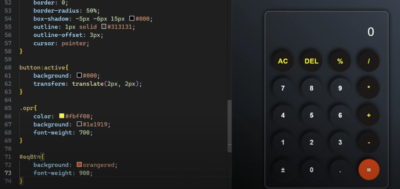
With backend development frameworks, each based on a different programming language in order to provide valuable insights into the recommended learning path for 2021. Django and Node.js serve as prime examples of these frameworks with notable distinctions between them.
Django, a Python web framework. Operates at a high level and prioritizes swift development to assist web developers in creating applications promptly. On the other hand, Node.js is built upon JavaScript and finds its application in client side web development. When it comes to web development choosing the right framework is crucial for project success. Node.js and Django are two popular options that developers often consider. Understanding their differences is essential for making an informed choice. In this article we will compare Node.js and Django in various aspects to help you make the right decision. Let’s start with performance:
Node.js:
- Built on JavaScripts’ event driven non blocking I/O model. – Efficiently handles a large number of concurrent connections;
- Ideal for real time applications and high scalability.
Django:
- Utilizes Pythons’ synchronous model. – Offers excellent performance for complex web applications. – Well suited for heavy computational tasks.
Development Speed
Node.js provides a lightweight and flexible environment that allows for rapid development. It offers a wide range of modules and libraries that can be easily implemented, making it perfect for quickly creating Minimum Viable Products (MVPs). On the other hand, Django follows the principle of “Don’t Repeat Yourself” (DRY), which promotes code reusability. It comes with a comprehensive set of built-in features and tools that accelerate development time, particularly for complex applications that require structured development.
Language and Ecosystem:
Node.js is based on JavaScript, which is widely used in the programming world. It has a vast ecosystem with numerous packages, frameworks, and libraries available. This is especially beneficial for front-end developers who are already familiar with JavaScript. On the other hand, Django is built on Python, known for its simplicity and readability. It also has an extensive ecosystem with a wide range of libraries and frameworks. Django enables developers to leverage the capabilities of Python beyond web development.
Community and Support:
Node.js has a large and active community of developers who provide extensive documentation, tutorials, and online resources. The framework receives regular updates with new features and bug fixes to ensure its continued improvement. Similarly, Django has a vibrant community of developers and enthusiasts. It offers comprehensive documentation and a wealth of educational resources. Regular releases of updates and security patches contribute to the framework’s stability and reliability.
Performance
Node.js is built on JavaScript’s event-driven, non-blocking I/O model. This architecture allows it to efficiently handle a large number of concurrent connections, making it an ideal choice for real-time applications and highly scalable projects. On the other hand, Django utilizes Python’s synchronous model, which contributes to its excellent performance when dealing with complex web applications and computationally intensive tasks.
Choosing between Node.js and Django depends on your specific project requirements and preferences. Node.js excels in development speed, scalability, and real-time applications, while Django emphasizes code reusability, structured development, and performance for complex applications. Consider factors such as your team’s expertise, the nature of your project, and the available resources and support when making your decision.
Development Speed
Node.js provides a lightweight and flexible environment for rapid development. It offers an extensive collection of modules and libraries for quick implementation, making it perfect for swift creation of Minimum Viable Products (MVPs). On the other hand, Django emphasizes the principle of “Don’t Repeat Yourself” (DRY), promoting code reusability. It comes with a comprehensive set of built-in features and tools, accelerating development time, especially for complex applications.
Scalability
Node.js is highly scalable due to its non-blocking, event-driven architecture. It efficiently handles a large number of concurrent connections, making it a popular choice for real-time data processing applications. On the other hand, Django provides robust scalability options to handle high traffic loads. It supports horizontal scaling using load balancers and multiple server instances, making it suitable for building large-scale enterprise applications.
Language and Ecosystem
Node.js is based on JavaScript, a widely-used programming language. It offers a vast ecosystem with numerous packages, frameworks, and libraries, making it beneficial for front-end developers already familiar with JavaScript. On the other hand, Django is built on Python, known for its simplicity and readability. It has an extensive ecosystem with numerous libraries and frameworks, enabling developers to leverage Python’s capabilities beyond web development.
To wrap up
The choice between Node.js and Django depends on your project’s specific requirements. Node.js excels in handling real-time applications, scalability, and fast-paced development. On the other hand, Django is an excellent choice for complex projects, emphasizing code reusability and structured development.
- Consider factors such as your team’s expertise, long-term goals, and the specific needs of your project. Evaluate priorities, test both frameworks, and consult with experienced developers before making a decision. Both Node.js and Django have active communities and provide ample support. Choose wisely to ensure the success of your web development endeavors;
- Both Django and Node.js stand as formidable technologies, each possessing a wealth of potential applications. When selecting the optimal choice for one’s needs, it is crucial to assess the priorities of the project and consider the following recommendations;
- If the aim is to develop a minimum viable product (MVP) swiftly, accommodate scalability, handle complex functionalities, and ensure robust security measures, Django emerges as an excellent option. Particularly in the realm of fintech, Django proves itself as a reliable choice;
- On the other hand, Node.js shines when it comes to crafting APIs, building services that demand high bandwidth, and constructing microservices. Its efficiency in these areas makes it an ideal choice for such projects.
For ventures involving eCommerce, it is worth considering the utilization of open-source eCommerce platforms.
Small businesses often start with a simple website builder solution before migrating to more robust frameworks like Django or Node.js as their needs grow and scale.
To delve deeper into this topic, one can explore comprehensive guides available here and here, which provide valuable insights and assistance in this domain.
FAQ:
Determining whether Django is better than Node.js depends on the specific context and requirements of a project. Django excels in rapid development, scalability, and robust security, making it an excellent choice for complex applications and industries like fintech. Node.js, on the other hand, is well-suited for building high-performance APIs, handling real-time applications, and microservices. Ultimately, the choice between Django and Node.js should be based on the specific needs and goals of the project.
Django and Node.js serve different purposes and have distinct strengths, so it is unlikely that Django can completely replace Node.js or vice versa. Each technology has its own niche and excels in specific areas. While Django is a high-level Python web framework emphasizing rapid development and security, Node.js, based on JavaScript, is known for its efficiency in creating APIs, handling real-time applications, and facilitating high-performance services. The choice between the two would depend on the requirements and objectives of the project at hand.
No, Node.js and Django are not the same. They are two different technologies used for backend web development but based on different programming languages. Django is a Python-based web framework, while Node.js is based on JavaScript. They have different approaches, syntax, and ecosystems. Django follows a high-level and opinionated approach, emphasizing rapid development, while Node.js provides a more flexible and lightweight environment for building scalable and high-performance applications.
Django has proven to be highly effective in powering websites, and NASA serves as a prominent example of its success. The implementation of Django provides NASA with a robust security framework, a crucial aspect for an organization of its nature. Despite catering to a substantial user base, with approximately a million daily visitors, the NASA website operates seamlessly. Notably, the site distinguishes itself through its intuitive interface and visually appealing design. Furthermore, it showcases the capability to seamlessly handle high-definition videos, enhancing the overall user experience.







